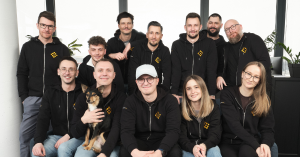Research and development plays a key role in regional innovation growth in the rapidly evolving landscape of artificial intelligence and machine learning. Through our CEE AI Report 2023, The Recursive aims to identify the CEE’s transformative potential. Diving into the contributions to the field, challenges, and prospects, prominent Czech researcher Tomas Mikolov shares his perspective and insights into the emerging regional AI ecosystem, discussing areas from talent and education to regulations and the ethical dimensions of AI.
Tomas Mikolov is a Senior Researcher at the Czech Institute of Informatics, Robotics and Cybernetics (CIIRC) in Prague in the field of machine learning and artificial intelligence with a profound long-term interest in creating programs that can communicate naturally with people through language. He previously acted as a Research Scientist at Google and Facebook.
Tomas has been working on statistical language modeling since 2006, when he made numerous impactful discoveries, including the RNNLM (Recurrent Neural Network Language Modeling) toolkit, which he open-sourced in 2010, demonstrating for the first time concepts such as large neural language models, text generation, neural language model adaptation, and several others.
The following interview was conducted as a part of The Recursive’s “State of AI in CEE” report. Download the full report with insights from 40+ experts and an analysis of 900 AI product companies from CEE here.
The Recursive: Considering your notable contributions to the AI field, what are your current plans and goals you are aiming to achieve in the Czech Republic?
Tomas Mikolov: After returning to the Czech Republic, I have two main interests – to create a research group focusing on fundamental problems in AI, such as unsupervised learning, long-term memory, spontaneous evolution, and complexity growth. The other is to build a local AI company, focusing on the areas where I’m an expert. For these projects to succeed, I need smart and hard-working people as well as funding. So far, I’ve been more successful with the former, as there are many educated and motivated people in our region. However, public funding of AI research is, from my perspective, almost non-existent.
How would you evaluate the availability and quality of AI talent and R&D in the Czech Republic compared to other European countries and globally?
Tomas Mikolov: Students, researchers, and engineers are on a very good technical level here. We’re certainly not behind other countries in Europe when it comes to AI talent. This may, however, change rather quickly and not in a good way.
AI specifically has been a priority for many European countries in recent years and even longer for the US and China. While others are massively investing in AI, the Czech Republic isn’t treating AI seriously as an integral part of modern industry. We have all kinds of small initiatives, plans, presentations, etc., but when you compare the numbers, we need to catch up in terms of real investment, even compared to countries such as Poland or Bulgaria.
Otherwise, we have very well-established research groups that are well-known worldwide, focusing on areas such as computer vision, speech recognition, image processing, natural language processing, and others. However, if the current catastrophic situation with the lack of funding continues, we’re going to lose much of the current talent.
Compared to other countries, does the Czech Republic face challenges or limitations in AI research and development?
Tomas Mikolov: In my view, we need to establish an AI Institute in the Czech Republic, just like many other European countries already did.
“We need to focus not only on the excellence of basic research but also on modern, up-to-date education, the AI startup ecosystem, and the transfer of research results to industry. In other words, we need more experts on commercialization, which is the engine behind the success of areas such as Silicon Valley.”
How do Czech educational institutions and universities contribute to the talent pool for AI professionals? How do you evaluate the availability and accessibility of professional development and training opportunities for AI specialists?
Tomas Mikolov: The Czech technical universities are on a very good level. However, AI is a very modern and rapidly changing area, and the traditional educational system needs to be better suited for it due to its rigidity. Our industry desperately needs more AI experts than the current system can produce. That’s why I think we need a quick program focusing on AI education and nothing else.
For example, just this year, with the boom of language models, there is a huge demand for this expertise from both startups and big companies. On the other hand, I supervise students who only had a single basic lecture on natural language processing in five full years of their studies. We have to improve this to be competitive with the rest of the world.
What are the current and upcoming regulations in the Czech Republic or the EU affecting AI research and development?
Tomas Mikolov: I do not follow this closely, mainly for two reasons – the plans for AI regulations seem to be frequently changing, and I simply do not have the capacity for this. More importantly, some of the plans I’ve seen previously were clearly prepared by non-experts who did not consult their plans for regulating AI technologies with the AI community. I hope the final version will focus on the truly important matter – to protect the modern tech industry in Europe and our citizens from possible harm.
“The AI regulations, from my perspective, cannot dismiss the importance of AI for our industry and the fact that, currently, the EU is lagging behind the rest of the world. In short, the regulations should protect us, not hurt us.”
Have you encountered any ethical dilemmas in your research that arose due to potential AI applications?
Tomas Mikolov: To be honest, ethical dilemmas are associated with any type of important technology. Let’s not make wide-eyed assumptions about AI being close to some Terminators or similar sci-fi. Realistically, we should discuss ethical dilemmas on the same level as, for example, ethical dilemmas of the internet, social networks, or smartphones. That is, we should not dismiss such discussions, but the current level is overblown. We first need to ensure the AI tech sector exists in Europe and that it is creating value here. The biggest threat I currently see is that we will be dominated in this industry by companies from the US and China, and then all talks about ethics will be futile.
What opportunities do you see for collaborations among the AI stakeholders in the Czech Republic and CEE region to drive AI innovation?
Tomas Mikolov: In our region, the IDEAS NCBR AI institute in Poland looks promising. I think we should replicate it here in the Czech Republic. It would be the place that can coordinate all of the above – collaborations between research institutions, universities, and industry.
How do you see the Czech and CEE region’s AI innovation evolving in the next 5-10 years?
Tomas Mikolov: Disruptions are already ongoing. I’d say that the Czech Republic has been the leader in AI research among all countries from Eastern Europe. Now, due to serious support from their governments, Poland and Bulgaria are on a trajectory to get ahead of us. That’s quite unfortunate, especially since AI is no longer just an academic problem that only enthusiasts work on, but it is a crucial part of the modern industry.I still hope this will get recognized by our government and that the AI tech sector will get the same support other countries provide.







